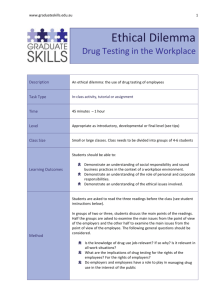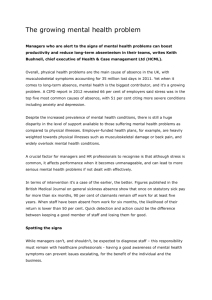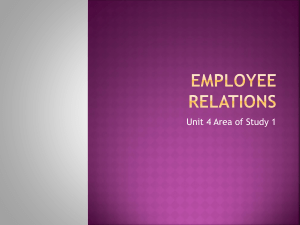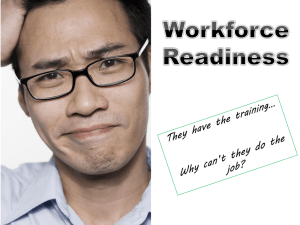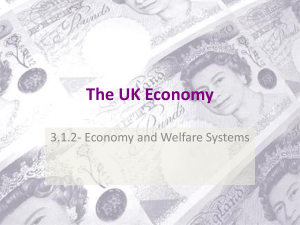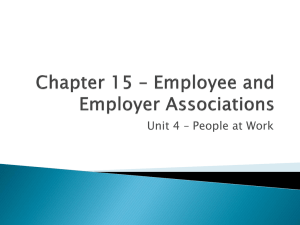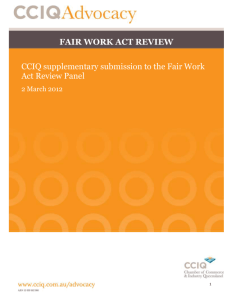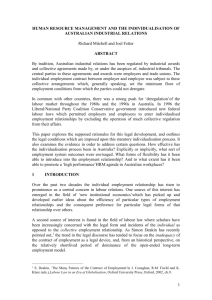Business push back
advertisement
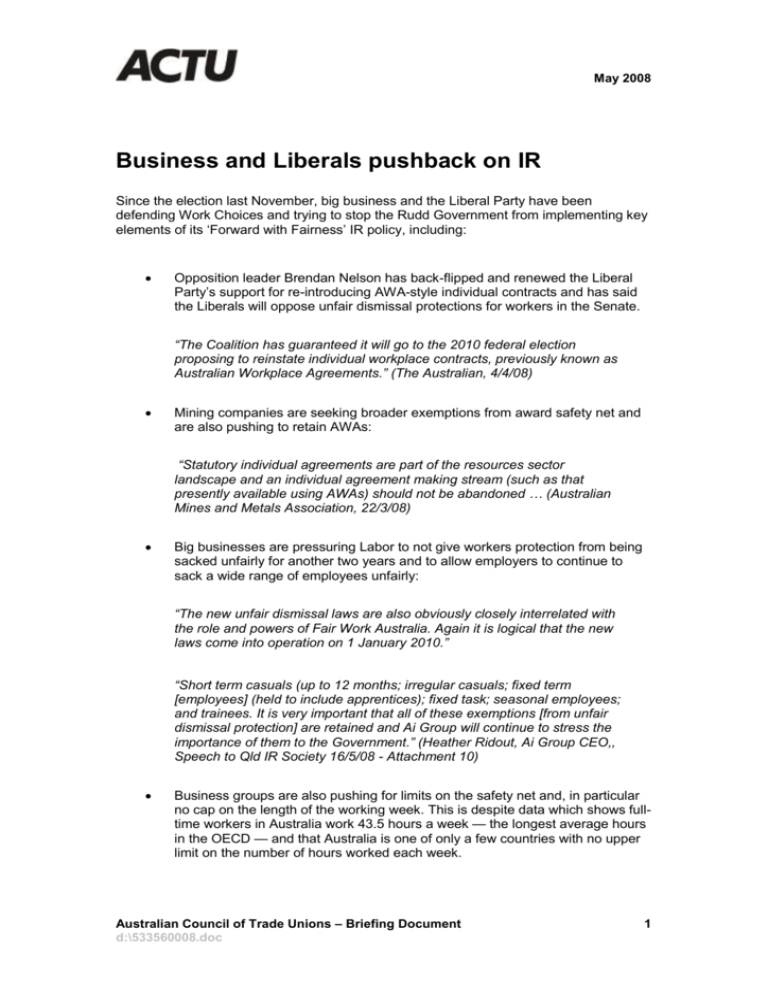
May 2008 Business and Liberals pushback on IR Since the election last November, big business and the Liberal Party have been defending Work Choices and trying to stop the Rudd Government from implementing key elements of its ‘Forward with Fairness’ IR policy, including: Opposition leader Brendan Nelson has back-flipped and renewed the Liberal Party’s support for re-introducing AWA-style individual contracts and has said the Liberals will oppose unfair dismissal protections for workers in the Senate. “The Coalition has guaranteed it will go to the 2010 federal election proposing to reinstate individual workplace contracts, previously known as Australian Workplace Agreements.” (The Australian, 4/4/08) Mining companies are seeking broader exemptions from award safety net and are also pushing to retain AWAs: “Statutory individual agreements are part of the resources sector landscape and an individual agreement making stream (such as that presently available using AWAs) should not be abandoned … (Australian Mines and Metals Association, 22/3/08) Big businesses are pressuring Labor to not give workers protection from being sacked unfairly for another two years and to allow employers to continue to sack a wide range of employees unfairly: “The new unfair dismissal laws are also obviously closely interrelated with the role and powers of Fair Work Australia. Again it is logical that the new laws come into operation on 1 January 2010.” “Short term casuals (up to 12 months; irregular casuals; fixed term [employees] (held to include apprentices); fixed task; seasonal employees; and trainees. It is very important that all of these exemptions [from unfair dismissal protection] are retained and Ai Group will continue to stress the importance of them to the Government.” (Heather Ridout, Ai Group CEO,, Speech to Qld IR Society 16/5/08 - Attachment 10) Business groups are also pushing for limits on the safety net and, in particular no cap on the length of the working week. This is despite data which shows fulltime workers in Australia work 43.5 hours a week — the longest average hours in the OECD — and that Australia is one of only a few countries with no upper limit on the number of hours worked each week. Australian Council of Trade Unions – Briefing Document d:\533560008.doc 1 May 2008 “Business groups have called for the government to allow working hours to be averaged over periods as long as a year to facilitate lengthy rosters… The government is considering exempting professionals and other high income earners from any limits on working hours, in a move backed by most employer organisations.” (AFR 8/4/08) “Deputy Prime Minister Julia Gillard has handed the mining sector another concession on industrial relations by promising the Labor’s tougher employment safety net will not stop employers from insisting on lengthy working hours and rosters for workers on remote mine sites.” (AFR 2/8/08) Employers are pushing to limit collective bargaining by restricting the content of agreements and curtail unions “A number of business groups are pushing the government to limit the scope of matters that can be covered by workplace agreements, despite Labor’s pledge to allow employers and employees to bargain on any matters they choose. (AFR 10/4/08) “The Rudd government’s key business advisers on industrial relations are considering ways to restrict the content of workplace agreements, curtail the growth in union power and discourage strikes under Labor’s next wave of employment law reforms.” (AFR 12/3/08) Big businesses are pushing the Government to overhaul workers’ compensation in a way which would reduce their costs and reduce payouts for injured workers “The Rudd Government is under pressure to radically overhaul the federal workers’ compensation scheme by opening it up to all employers who operate over state boundaries and forcing greater competition between high-cost state schemes. (AFR 30/4/08) Business is also supporting keeping Work Choices restrictions on the right of workers to access unions in their workplace: “Although the [new] legislation will ban AWAs, Labor’s reforms will not alter the national system of industrial relations, tough restrictions on union rights to enter workplaces and disincentives for industrial action that were key parts of Work Choices.” (AFR 20/3/08) Australian Council of Trade Unions – Briefing Document d:\533560008.doc 2 May 2008 Employers warn government against workers’ right to collective bargaining and call to retain Work Choices limits on role of independent umpire to settle and arbitrate disputes “Ai Group’s preferred position is that the Government retain an entirely voluntary bargaining system… [whereby] employers should not be legally compelled to bargain [even if a majority of employees in a secret ballot vote in support].” “Ai Group is worried about the Government’s compulsory arbitration proposal and will continue to argue it should be abandoned… In AI Group’s view, access to arbitration should not be extended beyond the circumstances presently provided for in the [Work Choices] Act.” (Heather Ridout, Ai Group CEO,, Speech to Qld IR Society 16/5/08) Employers have already lobbied the Rudd Government and won the ability to offer short term AWA-style contracts “”Employers will be able to offer short term individual contracts to a wider range of staff when the government scraps Australian workplace agreements (AWAs) under last-minute changes to Labor’s workplace reforms… [the] new provision will benefit businesses with cyclical workforces such as those in construction and mining sectors.” (AFR 19/3/08) Employers now expect a ‘satisfactory outcome’ to their demands for changes to the IR policies the Government presented to the public at the last election “The Government have put in place a number of commitments around secret ballots around secondary boycott retention, right of entry arrangements, pattern bargaining commitments which should be quite helpful going forward… Then what happens when you can’t get agreement and access to arbitration [is an outstanding concern] , and that is something that there’s a lot of dangers attached to it if we get this wrong. And we are very confident that we will be able to work with the Government to get some satisfactory outcomes.” (Heather Ridout, AI Group CEO, ABC TV 7.30 Report 14/5/08) Australian Council of Trade Unions – Briefing Document d:\533560008.doc 3

